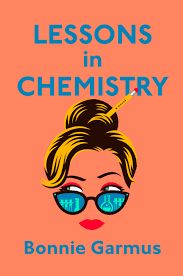Chapter 29: Bonding
byIn the chapter titled “Bonding,” Elizabeth Zott takes her cooking show Supper at Six to new intellectual heights, seamlessly blending scientific concepts with practical cooking lessons. Elizabeth’s unflinching determination to educate her audience is evident as she introduces the three types of chemical bonds—ionic, covalent, and hydrogen—while drawing surprising parallels between these bonds and human relationships. Her audience, comprising a mix of curious homemakers and skeptical intellectuals, listens intently as she breaks down these complex ideas into relatable metaphors. With her signature French twist hairstyle and calm yet authoritative demeanor, Elizabeth transforms her kitchen set into a platform for empowerment and education, transcending the conventional boundaries of television.
Elizabeth’s lessons on chemical bonding become a metaphor for life itself. She explains that ionic bonds represent opposites attracting, a concept that resonates with viewers who see it reflected in their own relationships. Covalent bonds, she continues, embody the strength found in unity, a reminder of the importance of collaboration and mutual support. Finally, hydrogen bonds symbolize fleeting yet vital connections, reminding her audience that even brief encounters can leave lasting impacts. These scientific explanations are interwoven with her cooking demonstrations, such as the role of molecular structures in achieving the perfect sear on a piece of meat or how water’s unique bonding properties make it essential for a moist, tender roast. Through her show, Elizabeth encourages her audience to view cooking as more than a domestic chore—it’s a scientific experiment and an expression of creativity.
Behind the scenes, tensions are brewing. Walter Pine, Elizabeth’s producer, faces mounting pressure from the network to make the show less academic and more marketable, a demand that clashes with Elizabeth’s commitment to intellectual integrity. Walter, torn between his loyalty to Elizabeth and the demands of his job, finds himself in a moral dilemma. The network executives are particularly keen on toning down Elizabeth’s outspoken personality, fearing that her insistence on challenging societal norms might alienate advertisers. Despite this, Elizabeth remains resolute, refusing to dilute her content or conform to expectations that undermine her mission to empower her audience through knowledge.
The narrative takes a poignant turn when Elizabeth interacts with a timid audience member, Mrs. George Fillis, who hesitantly shares her lifelong dream of becoming a heart surgeon. Encouraging Mrs. Fillis to pursue her aspirations despite societal expectations, Elizabeth reminds her viewers—and herself—that it’s never too late to follow one’s passions. This moment of connection transcends the boundaries of a typical cooking show, reinforcing Elizabeth’s role not just as a chef and scientist but also as an advocate for personal growth and societal change. The exchange leaves an indelible mark on Mrs. Fillis, who begins to believe in her own potential, and on the audience, who are inspired to rethink the limitations placed upon them by tradition and convention.
Meanwhile, Elizabeth faces challenges at home as she juggles her role as a single mother with the demands of her public career. Her daughter, Madeline, serves as a constant reminder of the stakes involved in her fight against societal norms. Elizabeth’s defiance of traditional expectations, both as a scientist and a television personality, is not just for her viewers—it’s a legacy she hopes to pass down to Madeline. This dual commitment to her public and private roles showcases Elizabeth’s resilience and underscores the sacrifices she makes in pursuit of a better future for the next generation.
The chapter concludes with a subtle yet powerful moment: Elizabeth, undeterred by the external pressures surrounding her, calmly prepares for her next segment, her eyes filled with quiet determination. She knows that her work is more than just a television show; it’s a movement. Through her unique approach to blending science with cooking, Elizabeth continues to challenge societal norms, inspire personal growth, and advocate for a world where knowledge is valued over appearances and substance over spectacle.
This chapter serves as a testament to Elizabeth Zott’s unwavering commitment to empowering others through education and her ability to weave profound lessons into seemingly mundane tasks. By transforming cooking into a metaphor for life and science, Elizabeth not only elevates the act of preparing food but also inspires her audience to embrace knowledge, question societal constraints, and believe in their own potential. Through her courage and conviction, Elizabeth leaves an indelible mark on everyone who watches her, proving that even in the face of adversity, one person’s determination can ignite meaningful change.


